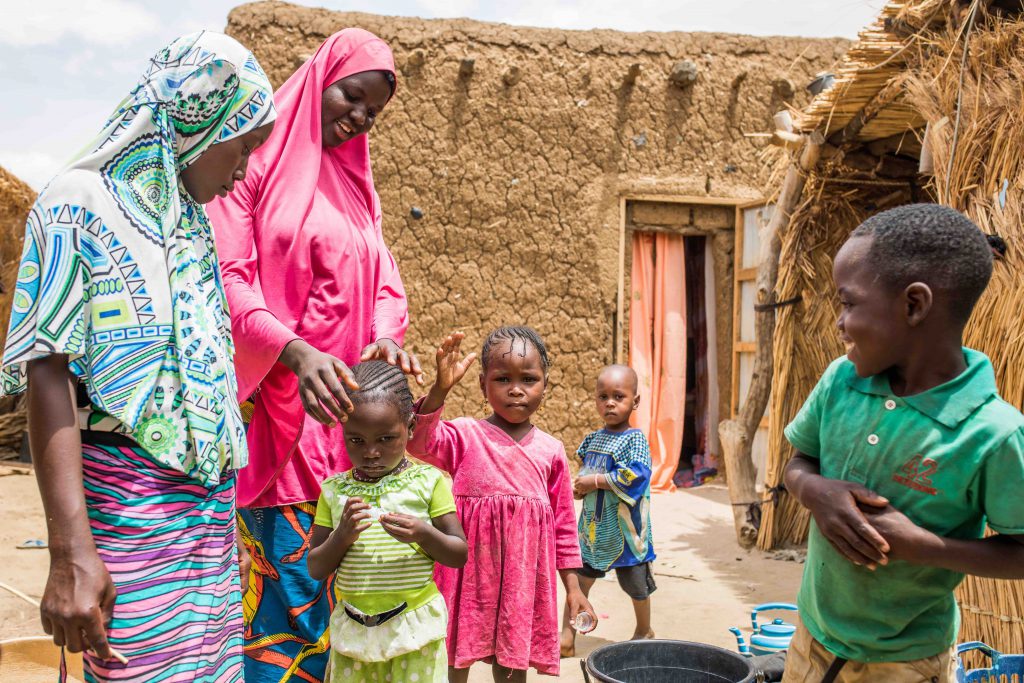The aim of the LAKANA trial is to determine whether the mass drug administration (MDA) of azithromycin can reduce the high mortality rate of 1 to 11 month-old children, and, if so, to determine the best frequency of administration.
To address this aim, we are gathering evidence to answer three specific research questions:
The target population for the trial are infants of 1 to 11 months of age who live in rural and peri-urban villages in Mali, Africa. Approximately 50-60 000 infants from 1151 villages will be included in the study sample.
The trial is conducted in accordance with Good Clinical Practice (GCP).
Participating villages are randomly allocated to one of three intervention groups:
Participating households within villages allocated to each group are visited quarterly (at 3-month intervals), nine times. At the first eight of these visits, children in the control group receive placebo, children in the second group receive azithromycin, and children in the third group receive azithromycin at quarterly visits between January and June and placebo at quarterly visits between July and December.
The study is double-blinded, meaning that neither the LAKANA research staff nor the participants know, if azithromycin or placebo was administered.
Mali is among the ten countries in the world with highest child mortality. As many as 10% of Malian children die before their fifth birthday. In addition to high mortality, the burden of infectious diseases is high among children in this age group.
Azithromycin is a broad-spectrum antibiotic often used to treat children and adults who suffer from different infections. It is widely used, safe and well tolerated. In addition, it is easy to administer, rather inexpensive and the World Health Organization has included it in the list of essential drugs.
In countries where the eye disease trachoma occurs, azithromycin has been administered in mass campaigns to the entire population in order to reduce the disease burden.
In such mass drug administration (MDA) campaigns, it has been shown that infant mortality decreased during the MDA period.

Subsequently, a large clinical trial carried out in three African countries confirmed the mortality benefits and suggested that the largest effects of Azithromycin MDA could be obtained in under one year old infants and in areas with the highest mortality.
The World Health Organisation has recommended consideration of azithromycin MDA to under-one-year old infants, in areas with high childhood mortality and a capacity to monitor changes in mortality and antimicrobial resistance The WHO has also called for new trials on azithromycin MDA, to strengthen the evidence base for recommendations.
The LAKANA trial team wants to clarify further the earlier observed connection between azithromycin MDA and reduced infant mortality. The team is also studying the impact of the intervention on antimicrobial resistance and infant morbidity, growth and nutritional status. Furthermore, the team assesses the mechanism of azithromycin action as well as feasibility and safety of the intervention.
For more details on the trial primary and secondary outcomes, please refer to the LAKANA Trial registration or review the study materials.
The trial is conducted in approximately 1151 villages in the Kayes, Kita, and Koulikoro regions of Mali. Within the selected villages, all adults that have children who are younger than 1 year of age are given the opportunity to consent to their child’s participation.
Participation in the LAKANA trial is completely voluntary and a parent can withdraw their child from the trial at any time.
The word LAKANA means “to protect, safe” in the Malian native language, Bambara and the name of the trial is derived from Large-scale Assessment of the Key health-promoting Activities of two New MDA (mass drug administration) regimens with Azithromycin.
LAKANA Trial is registered on ClinicalTrials.gov: Identifier NCT04424511